¿Alguna vez has intentado subir un archivo a tu sitio WordPress y te has topado con un muro de ladrillos? Es muy frustrante cuando no puedes subir esa imagen, plugin o tema que necesitas. Nuestros lectores a menudo nos piden ayuda con problemas de subida de archivos, ya que pueden llevar su flujo de trabajo a un rastreo.
A veces, estos límites de subida de archivos pueden impedirte añadir contenido a tu biblioteca de medios o instalar esos plugins y temas más grandes que necesitas. Es como estar atado de manos. Y es aún más molesto cuando no sabes cómo corregirlo.
Pero no te preocupes, estamos aquí para ayudarte. Nos encanta que WordPress sea una plataforma tan configurable, y a menudo hay múltiples maneras de resolver el mismo problema.
En esta guía, te mostraremos las formas más sencillas de aumentar el tamaño máximo de subida de archivos en WordPress. Te ayudaremos a superar esas limitaciones para que puedas volver a hacer lo que más te gusta: ¡dirigir tu sitio web!
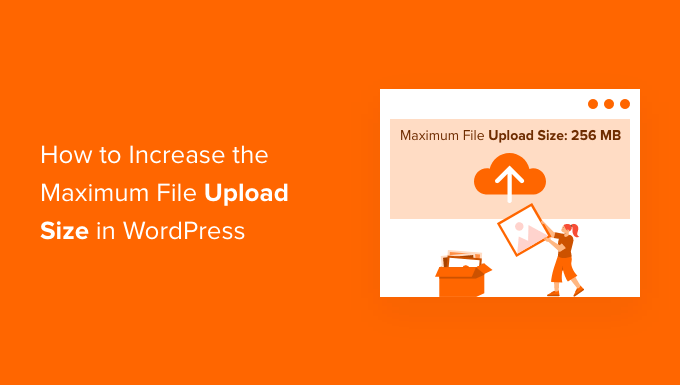
¿Por qué aumentar el tamaño máximo de subida de archivos en WordPress?
Tu proveedor de alojamiento de WordPress establecerá por defecto un tamaño máximo de subida de archivos cuando accedas e instales WordPress. Tu proveedor de alojamiento define este límite, que suele oscilar entre 2 MB y 500 MB.
Para la mayoría de los propietarios de sitios web en WordPress, este límite será más que suficiente.
Sin embargo, hay ocasiones en las que necesitará aumentar este límite para no encontrarse con errores de subida.
Por ejemplo:
- Tienes un sitio web de fotografía y necesitas subir imágenes grandes.
- Su porfolio de diseño o fotografía tiene imágenes grandes.
- Quieres instalar un tema o plugin de WordPress más grande.
- Quieres vender productos digitales como libros electrónicos, fotos, vídeos, etc.
- Actualiza regularmente el contenido y añade audio, fotos y mucho más.
Dicho esto, vamos a mostrarle cómo puede aumentar el tamaño máximo de subida de archivos en su sitio WordPress.
Nota: Ten en cuenta que mostrar muchos archivos grandes en tu sitio web puede ralentizar seriamente su velocidad y rendimiento. Por eso, normalmente recomendamos no subir nunca vídeos a WordPress.
Dado que la mayoría de los usuarios tienen diferentes configuraciones de alojamiento de WordPress, cubriremos lo siguiente:
- How to Check Your Maximum File Upload Size Limit in WordPress
- Method 1: Contact Your WordPress Hosting Provider
- Method 2: Create or Edit an Existing php.ini file
- Method 3: Add Code to Your WordPress Theme functions.php File
- Method 4: Add Code to Your .htaccess File
- Method 5: Use a WordPress Plugin to Increase File Upload Size
Cómo comprobar el límite de tamaño máximo de subida de archivos en WordPress
WordPress mostrará automáticamente el límite de tamaño máximo de subida de archivos cuando esté subiendo imágenes u otros medios.
Para comprobarlo, simplemente vaya a Medios ” Añadir nuevo en su panel de administrador de WordPress, y verá el límite de tamaño máximo de subida de archivos para su sitio WordPress.
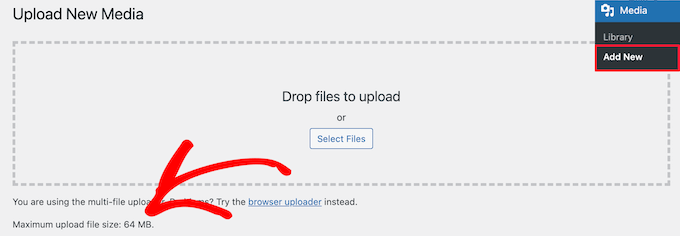
Ahora que ya sabe cómo encontrar el límite de tamaño, vamos a mostrarle cómo aumentar el tamaño máximo de subida en WordPress.
Método 1: Póngase en contacto con su proveedor de alojamiento de WordPress
Una de las formas más sencillas de aumentar el tamaño máximo de subida de archivos en WordPress es ponerse en contacto con su proveedor de alojamiento de WordPress.
Se trata de una tarea relativamente sencilla para su equipo de atención al cliente y puede realizarse en un par de minutos.
Para los principiantes, esto puede ser mucho más fácil que añadir código a WordPress y editar los archivos del servidor.
Sólo tienes que ir al sitio web de tu proveedor de alojamiento, como Bluehost, y acceder.
A continuación, haga clic en el icono “Chat” situado en la parte inferior de la pantalla. A continuación, puede solicitar al personal de soporte que aumente el tamaño de subida de archivos en su sitio de WordPress.
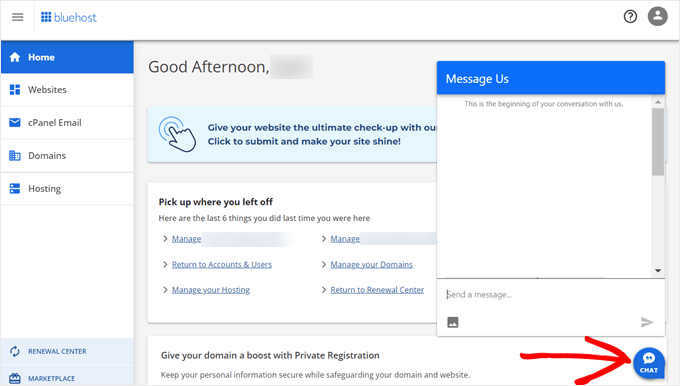
También puede contactar con el soporte desde el Escritorio de su cuenta de alojamiento.
Método 2: Crear o editar un archivo php.ini existente
Otra forma de aumentar el tamaño máximo de subida de archivos es creando o editando un archivo llamado php.ini. Este archivo controla una gran cantidad de ajustes para su entorno de alojamiento de WordPress.
La mayoría de los proveedores de alojamiento de WordPress, como Bluehost, disponen de un cPanel fácil de usar que te ayudará a gestionar tu sitio web.
Si tu alojamiento web tiene un Escritorio cPanel, entonces puedes aumentar el tamaño de subida de archivos a través de las herramientas integradas.
Nota: Lo siguiente es del cPanel de Bluehost. Sin embargo, la mayoría de los proveedores de alojamiento compartido tendrán pasos similares.
Encontrará un botón cPanel en la parte inferior de la pestaña Alojamiento en Bluehost.
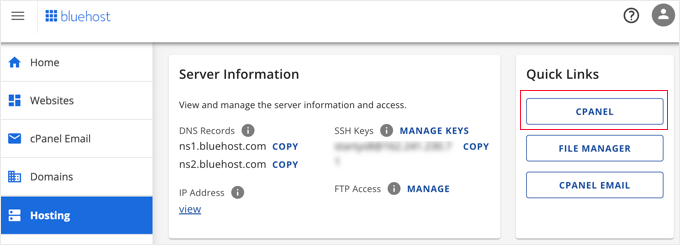
Al hacer clic en este botón se abrirá su Escritorio de cPanel.
Ahora tienes que desplazarte hasta la sección Software y hacer clic en ‘MultiPHP INI Editor’.
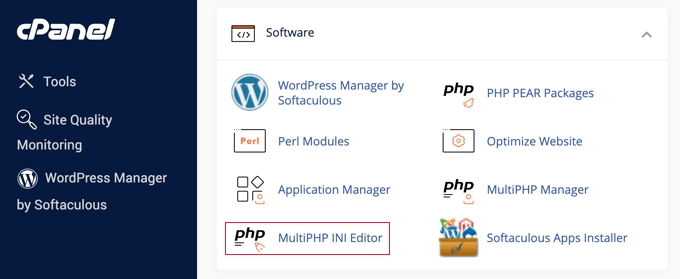
A continuación, desplácese hasta la sección “upload_max_filesize” e introduzca un nuevo tamaño máximo de archivo en la casilla.
A continuación, haga clic en el botón “Aplicar”.
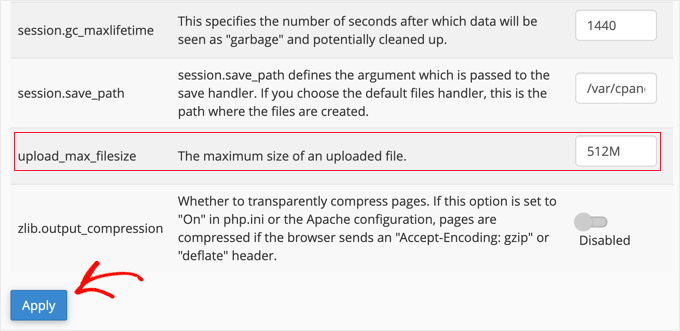
También puede hacer clic en la pestaña del menú “Modo editor” y, a continuación, modificar el tamaño máximo de subida de archivos directamente en el editor.
Tienes que editar la sección ‘upload_max_filesize’ para aumentar el tamaño de subida de tus archivos.
Cuando hayas terminado, sólo tienes que hacer clic en el botón “Guardar”.
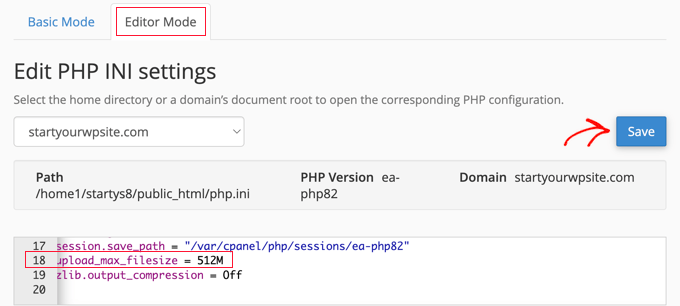
Editar php.ini añadiendo código
Si su proveedor de alojamiento actual no ofrece la opción de cPanel, tendrá que editar este archivo manualmente.
Para ello, puede utilizar un cliente FTP o la opción de gestión de archivos de su panel de control de alojamiento de WordPress.
Si utiliza alojamiento compartido, es posible que no vea el archivo php.ini en el directorio de su alojamiento. Si no lo ves, simplemente crea un archivo llamado php.ini y súbelo a tu carpeta raíz.
A continuación, añada el siguiente fragmento de código al archivo:
1 2 3 | upload_max_filesize = 256Mpost_max_size = 256Mmax_execution_time = 300 |
Puedes modificar el límite de ‘256M’ al tamaño de archivo que necesites para tu blog de WordPress.
Método 3: Añadir código al archivo functions.php de su tema de WordPress
Este método consiste en añadir código al archivo functions. php de su tema de WordPress.
En lugar de editar el archivo directamente, recomendamos usar WPCode. Es el mejor plugin de fragmentos de código que te permite añadir código a tu sitio web sin romperlo.
Si no lo ha hecho antes, consulte nuestra guía para principiantes sobre cómo añadir código personalizado en WordPress.
En primer lugar, debe instalar el plugin gratuito WPCode. Para más detalles, consulta nuestra guía paso a paso sobre cómo instalar un plugin de WordPress.
Una vez activado, debe navegar a Fragmentos de código ” + Añadir fragmento.
Tendrá que pasar el ratón por encima de la opción “Añadir su código personalizado (nuevo fragmento)” y, a continuación, hacer clic en el botón “+ Añadir fragmento de código personalizado”.
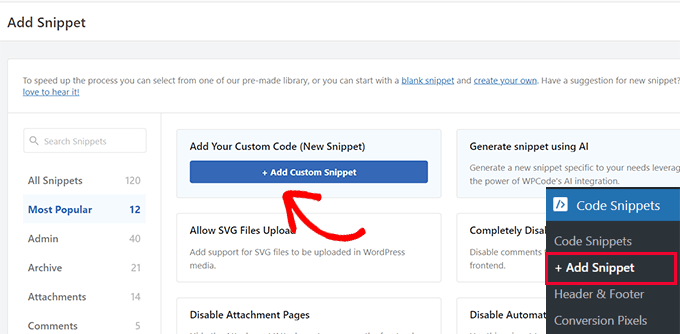
A continuación, debe elegir “Fragmento de código PHP” como tipo de código en la lista de opciones que aparece.
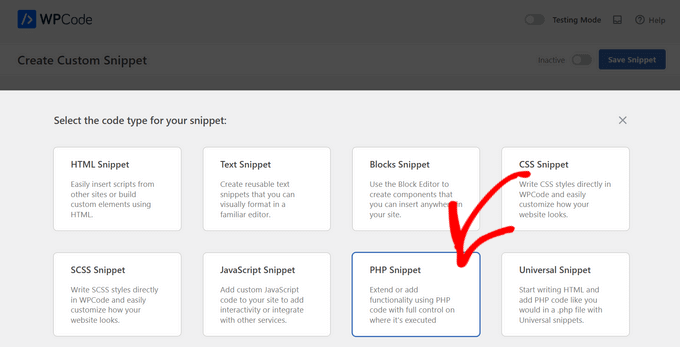
En la siguiente pantalla, introduzca un nombre para su nuevo fragmento de código, que puede ser cualquier cosa que le ayude a recordar para qué sirve el código.
A continuación, puede copiar y pegar el siguiente fragmento de código en ‘Vista previa del código’. Asegúrate de cambiar ‘256M’ por el tamaño máximo de archivo que necesites:
1 2 3 | @ini_set( 'upload_max_size' , '256M' );@ini_set( 'post_max_size', '256M');@ini_set( 'max_execution_time', '300' ); |
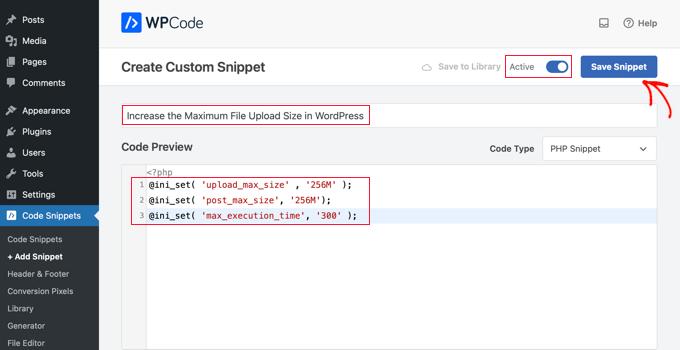
Por último, cambie el conmutador de la parte superior a “Activo” y, a continuación, haga clic en el botón “Guardar fragmento de código”. El código se ejecutará en su sitio web.
Método 4: Añadir código a su archivo .htaccess
Otra forma de aumentar el tamaño máximo de archivo es modificando el archivo .htaccess. Este archivo controla los ajustes de configuración de alto nivel de su sitio web.
Para ello, debe acceder al servidor de su sitio web a través de FTP. Si no ha hecho esto antes, consulte nuestra guía sobre cómo usar FTP para subir archivos a WordPress para principiantes.
A continuación, localice el archivo .htaccess en la carpeta raíz de su sitio web.

Si no puedes encontrar tu archivo .htaccess, entonces podría estar oculto por tu gestor de archivos o cliente FTP. Para obtener más información, consulte nuestra guía sobre por qué no puede encontrar el archivo .htaccess en su sitio de WordPress.
A continuación, debe añadir el siguiente fragmento de código a su archivo .htaccess:
1 2 3 4 | php_value upload_max_filesize 256Mphp_value post_max_size 256Mphp_value max_execution_time 300php_value max_input_time 300 |
Para aumentar aún más el tamaño máximo de subida de archivos, sólo tiene que cambiar ’64M’ por el tamaño que necesite.
Método 5: Utilizar un plugin de WordPress para aumentar el tamaño de la subida de archivos
Otra forma de aumentar el límite máximo de subida de archivos es usando el plugin WP Increase Upload Filesize. Si no te sientes cómodo añadiendo código a WordPress, entonces esta podría ser una buena opción para ti.
Lo primero que tienes que hacer es instalar y activar el plugin. Para más detalles, consulte nuestra guía sobre cómo instalar un plugin de WordPress.
Una vez activado, vaya a Medios ” Aumentar límite de subida en su panel de administrador de WordPress.
Esto le lleva a una pantalla en la que puede seleccionar un nuevo tamaño de archivo subido en el desplegable “Elegir tamaño máximo de archivo subido”.
A continuación, haz clic en el botón “Guardar cambios”.

Nota: El tamaño máximo de subida de archivos lo establece tu proveedor de alojamiento. Si necesita un límite de tamaño de archivo superior al que aparece en el desplegable, deberá ponerse en contacto con su proveedor de alojamiento y solicitar un aumento del límite.
Tutorial en vídeo
Si no te gusta seguir instrucciones escritas, puedes comprobar nuestro tutorial en vídeo:
Esperamos que este artículo te haya ayudado a aumentar el tamaño máximo de subida de archivos en WordPress. Puede que también quieras ver nuestra guía sobre cómo añadir tipos de archivo adicionales para ser subidos en WordPress y nuestra selección de plugins y consejos de expertos para mejorar el área de administración de WordPress.
If you liked this article, then please subscribe to our YouTube Channel for WordPress video tutorials. You can also find us on Twitter and Facebook.





Lisha Van Nieuwenhove
This help was BRILLIANT. THANK YOU!
WPBeginner Support
You’re welcome!
Admin
Ray Konopka
Thanks for the tips. My site is hosted in BlueHost so I first tried Method 2. However, after changing the upload_max_filesize value, the Add New media page for my site still showed 64 MB. I went back into the MultiPHP INI Editor and looked at the other values. One other value stood out:
post_max_size
Sets max size of post data allowed. This setting also affects file upload. To upload large files, this value must be larger than upload_max_filesize. Generally speaking, memory_limit should be larger than post_max_size.
After I increased the post_max_size value as well, then the Add New media upload page showed the new limit. Perhaps you can update the post to include this tip.
WPBeginner Support
Thank you for sharing this, we’ll be sure to look into it and possibly add it to the article in the future
Admin
Mark
All my limits were increased as suggested, but I started getting ‘files are too big’ after a plugin update. After double checking everything server and email side, the solution was changing from 5M to 5120kb in Contact Form 7 settings. The plugin suddenly stopped recognizing M when trying to override the default 1024kb setting.
WPBeginner Support
Thanks for sharing this should someone else run into this issue!
Admin
devshah
Function.php method is not Working.
WPBeginner Support
It would depend on your host and what else is set up on your server for what will work. If nothing else works you can always reach out to your host for assistance.
Admin
Halil AHMAD
The .htaccess worked for me. Thank you
Muzoora Barnabas
The .htaccess worked for me. Thank you
WPBeginner Support
Glad our recommendation was able to assist
Admin
Muhammad Farooqi
You comments and thanks secion is almost 10 times longer..than the content of this page is guarantee of your amazing tips
WPBeginner Support
We’re happy we can help so many WordPress users
Admin
Jacob Alas
The only method that worked for me was: htaccess Method
Thank you.
WPBeginner Support
Glad one of our methods was able to work for you
Admin
Daniyar Nauryz
htaccess Method has worked for me.
WPBeginner Support
Glad our recommendation worked for you
Admin
furqan
its not working.
WPBeginner Support
If the recommendations are not working for you, we would recommend reaching out to your hosting provider and they should be able to assist if this is something they’ve set on their end.
Admin
Abdullah Ashraf
Thank you so much. I tried all the methods and the last method was helpful for me.
I would like to know should I undo the second last step that was php.ini?
WPBeginner Support
It is not required to remove that file but you can remove it if it is not working for your server.
Admin
Bradley
None work.
WPBeginner Support
If none of our recommendations work, we would recommend reaching out to your hosting provider to see if it is a restriction that they have set on their servers.
Admin
Ben
If you have access to the FTP, can I just upload the file in the wp-content/uploads/[year]/[month] folder?
WPBeginner Support
If you do that you would need a plugin to find the images, we have a guide on how to do that below:
https://www.wpbeginner.com/plugins/how-to-bulk-upload-wordpress-media-files-using-ftp/
Admin
naved ahmed
Thanks a lot
.htaccess method worked for me.
You saved my lot of time.
Thanks again.
WPBeginner Support
Glad our guide was able to help you
Admin
Adio Usman
Does this method works for restoring backup that is up to 3.5gb manually?
WPBeginner Support
It would depend on the method you are using but it could help with restoring a backup that large.
Admin
viren
method 3 is perfectly worked for me.keep inspiring us.great work man.thnks
WPBeginner Support
Glad our recommendation was helpful
Admin
ayman
.htaccess methode worked with me
WPBeginner Support
Glad our recommendation was helpful
Admin
Sanchit Setia
Does this work on free hosting?
WPBeginner Support
You would want to check with your hosting provider if you are concerned
Admin
bara
It works for me
WPBeginner Support
Glad our recommendation helped you
Admin
abc
nothing is working for lms
WPBeginner Support
If none of the recommendations worked we would recommend reaching out to your hosting provider for assistance.
Admin
Ahmad
I tried this but the size did not change… status is same please help what should I do know I am using localhost
WPBeginner Support
You would want to try restarting your localhost service just in case, otherwise, you would want to ensure you added/editied the php.ini correctly for the most common reason.
Admin
Vittorio
I think
@ini_set( ‘upload_max_size’ , ’64M’ );
should be
@ini_set( ‘upload_max_filesize’ , ’64M’ );
WPBeginner Support
upload_max_size currently increases that value as well as a few other things which is why we don’t use upload_max_filesize
Admin
MFoale
Thank you. The 3rd method worked for me. Very useful post and video.
WPBeginner Support
You’re welcome, glad we were able to help
Admin
Masud Rana
Wow !its work. Thanks
WPBeginner Support
Glad our guide could help you
Admin
Oliver
IT WORKS!!! THANKS
I made a file ini.php then uploaded it, then renamed it from ini.php.txt to ini.php and it worked.
thanks
WPBeginner Support
You’re welcome, glad our guide was able to help
Admin
Brad
None of these works
WPBeginner Support
If our recommendations do not work you would want to reach out to your hosting provider to ensure they do not have it as part of their settings.
Admin
Arivazhagan
Method 2 worked for me thanks a lot ive been struggling with this for two days …
WPBeginner Support
You’re welcome, glad our recommended solution was able to help you
Admin
Sujan Chakraborty
you are great.I fix my problem by reading you post.Tnx
WPBeginner Support
Glad our article could be helpful
Admin
Krakawid
Method 3 worked
WPBeginner Support
Glad our recommendation worked for you
Admin
Tung
Method 1 worked wonders for me. Thanks a bunch!
WPBeginner Support
You’re welcome, glad our recommendation worked for you
Admin
Trasadu
Thanks Method 3 really worked for me.
WPBeginner Support
Glad our recommendation was helpful
Admin
Asad
How can i increase the upload limit while i have the wordpress hosting also functions.php isn’t updating
WPBeginner Support
If the file will not update, you would want to reach out to your hosting provider and they should be able to assist
Admin
Chris
I want to increase the limit to 250mb but i dont know if this exposes my site to security treats, though am only using gravity form and I have also set to disable php execution on my upload folder. And have allowed only jpg, and mp3 files.
Please do you think this may affect my site load times as huge upload is coming from several users?
WPBeginner Support
If multiple users attempt uploads at the same time it can have an effect on your site’s load time but it shouldn’t open you to security threats
Admin
Vinod
Thanks a lot!!! Method 3 worked for me
WPBeginner Support
Glad our recommendation worked for you
Admin
Janice
Nice article, but I tried adding your 3 lines of code to the functions.php file, but got an “unknown @ rule” error. What’s that all about?
WPBeginner Support
It would depend on the entire error but it could have been a hiccup with how the code was inserted, you may want to take a look at our guide here: https://www.wpbeginner.com/beginners-guide/beginners-guide-to-pasting-snippets-from-the-web-into-wordpress/
Admin
Abduaziz
Thanks a lot!!! Method 3 worked for me
WPBeginner Support
Glad our recommendation could help
Admin
Alexander Gartley
Thanks, this helped me troubleshoot an upload limit. I’m on a WordPress multisite network install, so it ended up being a setting in the Network Admin Settings.
I was confused at first, because my php settings were allowing larger uploads, but it was restricted in the Network Settings.
WPBeginner Support
Thanks for sharing what solved the problem for you
Admin
Ernesto
Would have been great if you have included the .user.ini method.
.user.ini uploaded in the root folder with the same value/text in your edited php.ini
Most of the time, only this method works for shared hosting.
ErnestPH
WPBeginner Support
The php.ini file should work the same as the user.ini file unless your specific host ignores the php.ini but thank you for sharing your recommendation
Admin
Mark
This is the only solution that works on my shared hosting server. Thanks Ernesto!
Tamir Davidoff
Not working for me.
I have followed this guide and double checked the php.ini file to make sure that the changed are in fact saved. changed htaccess file to increase limits. and also tried modifying the phpMyAdmin httpd-app.conf and php-settings.conf file. All of these files reflect max upload higher than 40m and my WP site does not reflect Any of these changes. Really frustrated here.
Please help me, thanks !
WPBeginner Support
If you haven’t already, you would want to reach out to your hosting provider to ensure there is not a setting on their end that is overriding what you are setting
Admin
rajesh
i have tried all 3 method none of them worked. i am trying to upload newspaper theme in my in my wordpress site. but every time it show that php.ini file upload max file size.
plz help me
WPBeginner Support
You would want to reach out to your hosting provider to ensure they don’t have a setting that is overriding the changes you made.
Admin
Adam Walsworth
Watchout for hidden php.ini files. In my setup I found 2 of them. The one which I found actually resolved the issue was found under
./etc/php/7.0/apache2/php.ini
modifying this file fixed my issue.
WPBeginner Support
Thanks for sharing your solution, with where that file is located we would recommend most users reach out to their hosting provider before looking in locations like that.
Admin
Rafiq khan
Thanks buddy i have solved my problem by adopting method 2 by editing my php.ini file
Thanks alot you are working great
WPBeginner Support
Glad our article could help
Admin
Carla
None of the above worked for me. A matter of fact, editing the htaccess file broke my site even after deleting the above code. Overwriting with a new file fixed the problem though.
I have a dedicated server on Bluehost. What worked for me was going in the WHM root, not cpanel nor FTP access. Search for MultiPHP INI Editor. Give it at least 5 minutes to load if you only see the title and icon. You can set you upload time, post size, etc. there. Works instantly, even if your site is using Cloudflare, without placing it in development mode or clearing the cache. I hope this helps someone.
WPBeginner Support
Thank you for sharing what worked for you, should other users be on a dedicated server, if they reach out and let BlueHost know the need to increase the upload size then BlueHost can normally edit that for them
Admin
Pezza
Great Stuff! .htaccess worked for me!
WPBeginner Support
Thank you, glad our guide could help
Admin
ReineR
htaccess metod worked for me, thanks!
WPBeginner Support
Glad our article could help
Admin
Ahmed
Work for me
3. htaccess Method
you need to click (show hidden files to view and edit this file).
WPBeginner Support
Glad our article could help
Admin
rahul
when i tried this
Unable to communicate back with site to check for fatal errors, so the PHP change was reverted. You will need to upload your PHP file change by some other means, such as by using SFTP.
this happened to me
whats the solution of this
WPBeginner Support
You would need to use FTP rather than WordPress itself to add the code: https://www.wpbeginner.com/beginners-guide/how-to-use-ftp-to-upload-files-to-wordpress-for-beginners/
Admin
Ephraim
I had been trying php.ini method but it never works please how will I set it..
Or you should please tell me the were to paste at function.php
WPBeginner Support
You would normally use a text editor to set the content in the php.ini file. For your functions.php it should go at the end normally so it can be removed later as needed. You may also want to check with your hosting provider if you are having trouble with these methods for if they can assist in increasing the file size for you.
Admin
Ivos G.
None worked for me. But this one fixed it – add to your .htaccess this line:
LimitRequestBody 104857600
WPBeginner Support
Thanks for sharing your solution for this issue
Admin
Achilleas
I am using Nginx and i had already setup properly the values for php in the php.ini but what fixed it was puting the same value in the server block with the variable client_max_body_size xxxM;
I am writing this hoping it will help someone.
Editorial Staff
Thank you for sharing this with us
Admin